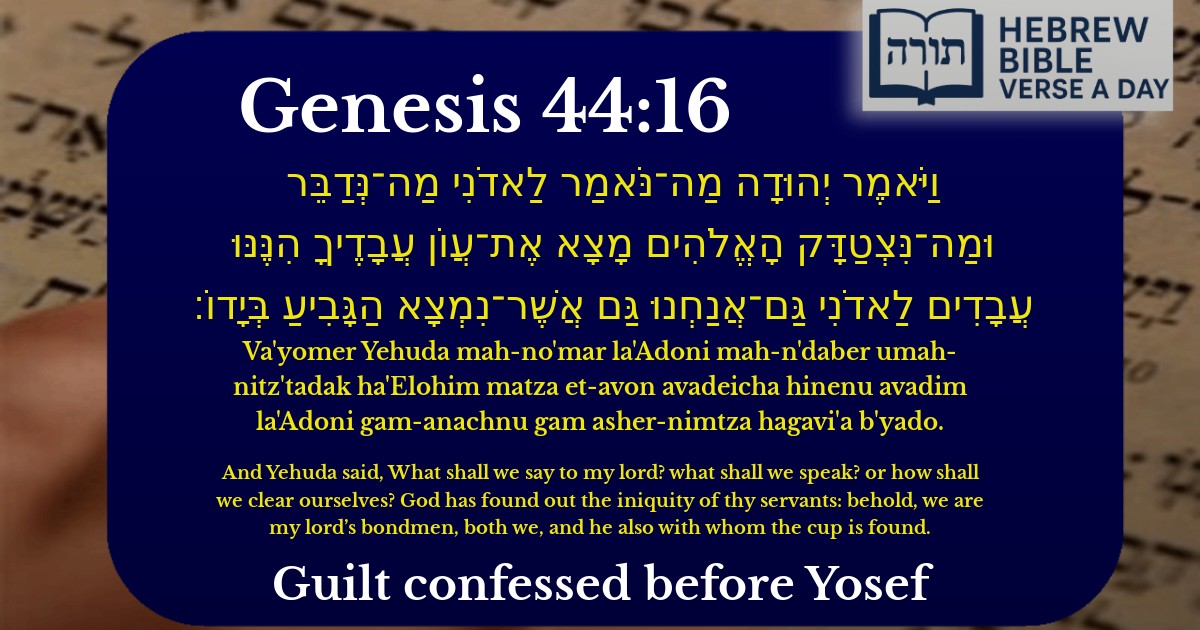Join Our Newsletter To Be Informed When New Videos Are Posted
Join the thousands of fellow Studends who rely on our videos to learn how to read the bible in Hebrew for free!
Hebrew Text
וַיֹּאמֶר יְהוּדָה מַה־נֹּאמַר לַאדֹנִי מַה־נְּדַבֵּר וּמַה־נִּצְטַדָּק הָאֱלֹהִים מָצָא אֶת־עֲוֺן עֲבָדֶיךָ הִנֶּנּוּ עֲבָדִים לַאדֹנִי גַּם־אֲנַחְנוּ גַּם אֲשֶׁר־נִמְצָא הַגָּבִיעַ בְּיָדוֹ׃
English Translation
And Yehuda said, What shall we say to my lord? what shall we speak? or how shall we clear ourselves? God has found out the iniquity of thy servants: behold, we are my lord’s bondmen, both we, and he also with whom the cup is found.
Transliteration
Va'yomer Yehuda mah-no'mar la'Adoni mah-n'daber umah-nitz'tadak ha'Elohim matza et-avon avadeicha hinenu avadim la'Adoni gam-anachnu gam asher-nimtza hagavi'a b'yado.
Hebrew Leining Text
וַיֹּ֣אמֶר יְהוּדָ֗ה מַה־נֹּאמַר֙ לַֽאדֹנִ֔י מַה־נְּדַבֵּ֖ר וּמַה־נִּצְטַדָּ֑ק הָאֱלֹהִ֗ים מָצָא֙ אֶת־עֲוֺ֣ן עֲבָדֶ֔יךָ הִנֶּ֤נּוּ עֲבָדִים֙ לַֽאדֹנִ֔י גַּם־אֲנַ֕חְנוּ גַּ֛ם אֲשֶׁר־נִמְצָ֥א הַגָּבִ֖יעַ בְּיָדֽוֹ׃
וַיֹּ֣אמֶר יְהוּדָ֗ה מַה־נֹּאמַר֙ לַֽאדֹנִ֔י מַה־נְּדַבֵּ֖ר וּמַה־נִּצְטַדָּ֑ק הָאֱלֹהִ֗ים מָצָא֙ אֶת־עֲוֺ֣ן עֲבָדֶ֔יךָ הִנֶּ֤נּוּ עֲבָדִים֙ לַֽאדֹנִ֔י גַּם־אֲנַ֕חְנוּ גַּ֛ם אֲשֶׁר־נִמְצָ֥א הַגָּבִ֖יעַ בְּיָדֽוֹ׃
🎵 Listen to leining
Parasha Commentary
📚 Talmud Citations
This verse is quoted in the Talmud.
📖 Sotah 7b
The verse is referenced in the context of discussing the concept of confession and repentance, illustrating Judah's admission of guilt and his plea for mercy.
📖 Sanhedrin 6b
The verse is cited in a discussion about divine justice and the acknowledgment of wrongdoing, highlighting Judah's recognition of God's role in uncovering their sin.


Yehuda's Admission of Guilt
In this verse (Bereishit 44:16), Yehuda acknowledges the brothers' culpability before Yosef (who they do not yet recognize). The phrase "הָאֱלֹהִים מָצָא אֶת־עֲוֺן עֲבָדֶיךָ" ("God has found out the iniquity of thy servants") reflects Yehuda's recognition of divine justice at work. Rashi explains that Yehuda is admitting that Hashem has orchestrated events to bring their past sins to light—specifically, their sale of Yosef into slavery. The brothers now perceive their predicament as divine retribution.
The Concept of Middah K'neged Middah
The Midrash (Bereishit Rabbah 92:8) highlights the principle of מידה כנגד מידה (measure for measure): just as the brothers deceived their father with a goat's blood (Bereishit 37:31), they are now confronted with Yosef's goblet (associated with wine, which resembles blood). The Sforno adds that their false accusation against Yosef (claiming he was torn by a wild beast) is now mirrored in their being accused of theft.
Yehuda's Leadership and Repentance
Ramban notes that Yehuda's confession marks a turning point in his character development. Earlier, he had proposed selling Yosef (Bereishit 37:26-27), but now he takes responsibility for Binyamin and the brothers. The Talmud (Sotah 7b) connects this to the broader theme of תשובה (repentance), as Yehuda demonstrates sincere remorse by offering himself and his brothers as slaves—showing his willingness to accept consequences.
The Goblet as a Symbol
The Malbim explains that the גָּבִיעַ (goblet) was not merely a drinking vessel but a tool Yosef used for divination (Bereishit 44:5). Its discovery in Binyamin's sack represents a test of the brothers' loyalty—would they abandon Binyamin as they once abandoned Yosef? Yehuda's response, offering collective servitude, proves their unity and growth.